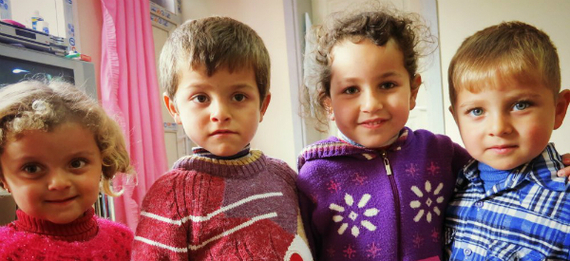I recently returned from a visit to the Syrian border, where I often heard refugees speak in hushed tones of "al-barmeel."
"What is it?" I asked.
When I heard the answer, I wished I had never asked the question.
Crudely packed with TNT, oil, nails, and assorted metal shrapnel, "al-barmeel" is Arabic for "the barrel." It refers to the barrels dropped by the Assad regime over residential areas -- neighborhoods, schools, hospitals, anywhere with enough women, men, and children to decimate and destroy.
I learned firsthand of the barrel bomb while visiting with Aisha*, a young woman my own age, lying on a small bed in a crowded hospital along Syria's border with Turkey.
Behind her tear-filled eyes was a story of unimaginable heartache. Her father shifted from one foot to another as he brokenly recounted their journey, in which he and his daughter emerged as sole survivors of a barrel bomb attack perpetrated against civilians by the Assad regime.
Aisha was living with her family in a small village in Syria when one day she heard the deafening sound of a helicopter rotor overhead. Covering her ears, she ran toward shelter -- but she was too late. Within seconds, sharp nails and large pieces of shrapnel rained down from the sky above her. She felt blood gushing from both legs as she stumbled toward the family's home.
Around her she saw shrapnel flying in every direction. In a moment there were screams followed by an eerie silence, smoke rising from the ashes that had once been her home -- and her family.
Shrapnel from the barrel bomb had sliced into the bodies of her mother, her sister, and her five small nephews, killing them in the most grotesque ways imaginable, cutting off their heads, their limbs, slicing the tiny bodies of her nephews in half. As Aisha stumbled through the smoke, screaming, she heard the weakened cries of her family, heard the final breaths of her small nephews.
There was almost no time, she told me, between hearing the sound of the helicopter and seeing the mangled bodies of her family around her. There was no warning. There was no time.
In the border hospital where she told me her story, Aisha was still shocked by what had happened. She collected herself momentarily to pull up a ragged blanket, revealing the gashes carved by the shrapnel in her leg. Her other leg was gone, sliced off in the attack.
Her father stood near her. At one point, he handed a piece of cardboard to his daughter. She, with trembling hands, gave it to me.
School photos of her five small nephews, each under the age of 10, were pasted on the cardboard -- Aisha's last relic of the family she lost.
"My nephews," she said, pointing to each one.
"This one was cut in half. This one was beheaded..."
24 people were killed that day, she recounted, all of them women and children.
Aisha's father explained that in the days after the attack Assad's regime announced that they had defeated the terrorists in that village. The regime reported that the 24 people they had killed were terrorists.
But they were all women and children, almost his entire family.
He tried to bury the bodies, he told me, but there wasn't time. Helicopters continued to return that day, flying low over the village and dropping more barrels. He knew his daughter would die of her injuries if she didn't receive help. They fled.
They had arrived at the border hospital just five days before.
I sat there in shocked silence, holding Aisha's hand in the cold hospital room, feeling hot tears streaming down my face, wondering what on earth I could say. I thought of my own small nephews at home in the States, wondered how on earth I would deal with such a loss.
Everyone was crying. Her father finally spoke, tears running down his face.
"I want the world to come and see what's going on," he said simply. "I want everyone to know."
But today, it seems, hardly anyone knows. And the brutal barrel bomb attacks perpetrated by the regime are on the increase.
In the last three days nearly 200 people have been killed in barrel bomb attacks by Syrian regime helicopters in Aleppo, according to aid group Doctors Without Borders. More than 800 more have been injured in the brutal attacks. Many are children.
And the silence shrouding their deaths continues. More than 100,000 people have died in Syria since the beginning of the conflict, countless numbers as a result of the regime's dreaded barrel bombs.
Aisha and her father are among the few who can still express the horror they saw firsthand, among the few who have survived the brutality now perpetrated on thousands more Syrian civilians.
I remember the agony with which she recounted her story, the pain with which she described the moment it hit, the moment her life shattered around her.
"Al-barmeel," she said, staring down at the floor.
*Names changed for protection.

